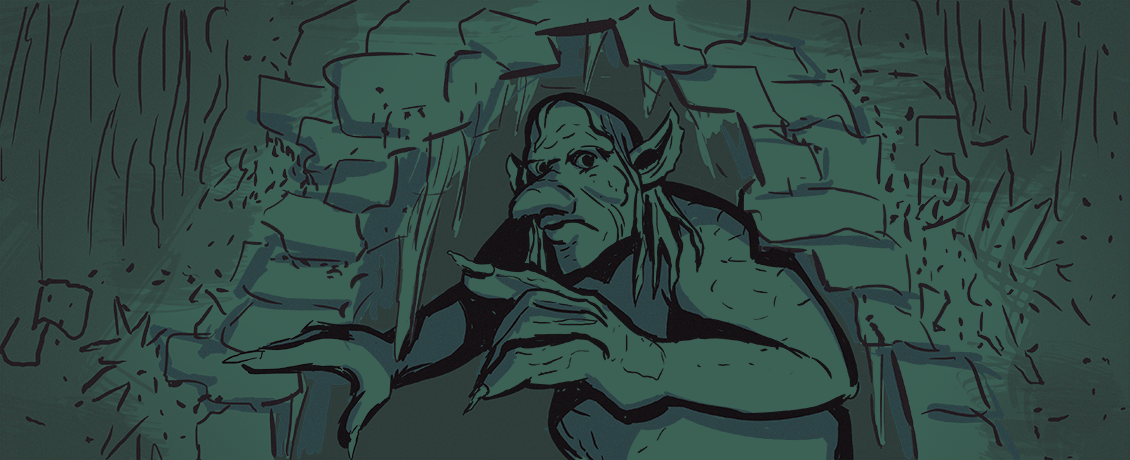Descendants of giants who shape the earth.
Troll Lore
 Illustration by @danaxbraga
Illustration by @danaxbraga
"Hey! Who invited you?" said the little tailor, driving away the unbidden guests. However, the flies, who did not understand German, would not be turned away, and they came back in ever-increasing numbers. Finally, losing his temper, he reached for a piece of cloth and shouted, "Wait, now I'm going to give it to you!" then hit at them without mercy. When he backed off and counted, there were no fewer than seven of them lying dead before him, with their legs stretched out.
"Aren't you someone?" he said to himself, surprised at his own bravery. The whole town shall hear about this." He hastily cut out a banner for himself, then embroidered on it with large letters, Seven with one blow. "The town?" he said further. "The whole world shall hear about this!" And his heart jumped for joy like a lamb's tail.
The tailor tied the banner around his body and set forth into the world, for he thought that his workshop was too small for such bravery. Before leaving he looked about his house for something that he could take with him. Finding nothing but a piece of old cheese, he put that into his pocket. Outside the town gate he found a bird that was caught in a bush. It went into his pocket with the cheese.
He bravely took to the road, and being light and agile he did not grow weary. The road led him up a mountain, and when he reached the top a huge giant was sitting there, looking around contentedly.
The little tailor went up to him cheerfully and said, "Good day, comrade. Are you just sitting here looking at the wide world? I am on my way out there to prove myself. Do you want to come with me?"
The giant looked at the tailor with contempt, saying, "You wretch! You miserable fellow!"
"You don't say!" answered the little tailor. Unbuttoning his coat, he showed the banner to the giant. "You can read what kind of man I am."
The giant read Seven with one blow, and thinking that the tailor had killed seven men, he gained some respect for the little fellow. But he did want to put him to the test, so he picked up a stone and squeezed it with his hand until water dripped from it.
"Do what I just did," said the giant, "if you have the strength."
"Is that all?" said the little tailor. "That is child's play for someone like me." Reaching into his pocket he pulled out the soft cheese and squeezed it until liquid ran from it. "That was even better, wasn't it?" he said.
The giant did not know what to say, for he did not believe the little man. Then the giant picked up a stone and threw it so high that it could scarcely be seen. "Now, you little dwarf, do that."
"A good throw," said the tailor, "but the stone did fall back to earth. I'll throw one for you that will not come back." He reached into his pocket, pulled out the bird, and threw it into the air. Happy to be free, the bird flew up and away, and did not come back. "How did you like that, comrade?" asked the tailor.
"You can throw well enough," said the giant, but now let's see if you are able to carry anything proper." He led the little tailor to a mighty oak tree that had been cut down and was lying on the ground. He said, "If you are strong enough, then help me carry this tree out of the woods."
"Gladly," answered the little man. "You take the trunk on your shoulder, and I will carry the branches and twigs. After all, they are the heaviest."
The giant lifted the trunk onto his shoulder, but the tailor sat down on a branch, and the giant, who could not see behind himself, had to drag long the entire tree, with the little tailor sitting on top. Cheerful and in good spirits, he whistled the song "There Were Three Tailors Who Rode Out to the Gate," as though carrying a tree were child's play.
This translation of the "The Brave Little Tailor" by the brothers Grimm describes a humorous competition between a clever tailor and a giant. This part of the story is actually about a tailor and a troll. If you read the entire story, you will see many elements that inspired the encounter between Bilbo Baggins and the three trolls (Bert, Tom, and William Huggins). In Tolkien's version, the trolls are outwitted by the wizard Gandalf who tricks them into arguing with each other until the sun comes up. Trolls live in mountains or dark forest caves because, if the sun touches them, they turn to stone. You can still witness the standing stones that were once trolls, littered across landscapes in many regions of the world. Journey to Trold-Tindterne in Norway and you can see the remains of two trolls armies, their conflict frozen forever in stone.
So why did this Grimm translation choose the moniker 'giant'? The reason is that the trolls are direct descendents of the mighty giants of Jotunheim – those ancient beings who, on the day of the Twilight of the Gods, scaled the rainbow bridge, and tore it down and, aided by a wolf and a serpent, destroyed the world. Their heritage is what grants them such tremendous strength and influence over the shape of the earth itself. In every land and region, trolls leave their mark upon the earth. Most adult trolls can uproot mature trees and smash large boulders. Distinguished trolls with pure bloodlines may even move mountains or change the course of rivers.
Despite their incredible strength, a troll is generally dull-witted, slow moving, and vicious to its core. In Bilbo's story, they are common robbers and demonstrate their selfishness and cruelty as they debate how to cook the dwarves. In Henrik Ibsen's dramatic poem Peer Gynt, they truly believe the horrible drink they brew is delicious and that their caves are "palaces". To prevent Peer Gynt from seeing how disgusting their dwelling places really are, they threaten to put out his eyes. An adventurer who encounters a troll should generally steer wide of them. If you are forced into contact, you must never underestimate their cruelty. Give them a modest puzzle or task to consider and, while they mull it over, get yourself quickly away.
Written by Giles Ravensong.
